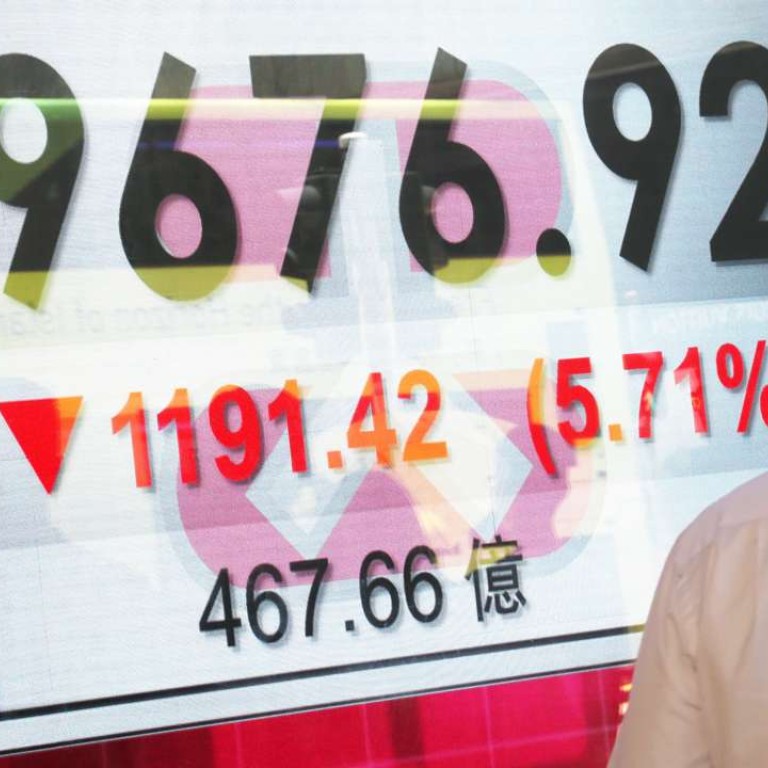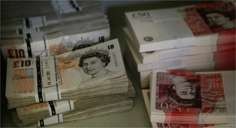
Hong Kong stocks recover from early Brexit panic selling
Hang Seng Index ends down 2.9 per cent at 20,259, after having dipped 5.8 per cent by late morning
Hong Kong stocks recovered slightly in Friday afternoon trading after an earlier panic sell off in the wake of the stunning UK referendum results.
The Hang Seng Index ended 609.2 points or 2.9 per cent lower at 20,259. At one point it had lost over 1,000 points or 5.8 per cent to 19,662.7 in late morning trading.
The H-share index slid 2.9 per cent or 255.0 points to end at 8,530.1.
Total turnover on the main board jumped 84.9 per cent from a day earlier to HK$99.8 billion.
The UK’s referendum result was announced on Friday around 2pm China time, with 52 per cent of voters opting for Brexit compared with 48 per cent for remain, after nearly half a century staying in the European Union.
Among 50 constituents of Hang Seng Index, shares of London-based HSBC took the hardest hit, tumbling 6.59 per cent to end at HK$47.45. The trading volume soared to 276 million shares compared with a daily average of only 20 to 40 million shares.

Standard Chartered, which is not in the blue-chip index, saw its shares plunge 9.48 per cent to HK$57.75.
Only three blue-chip companies gained: high-dividend paying CLP Holdings, The Hong Kong and China Gas Company and Link Real Estate Investment Trust, which all rose 0.2 to 0.4 per cent.
Gold-related shares became the rare winner in Hong Kong following a frantic global hunt for safe havens amid worries of a global stock rout, with the spot gold price rocketing up 8.1 per cent, the largest one-day increase since 2008 financial crisis, to its two-year high at US$1,358.54 an ounce.
China Gold International Resources jumped 5.64 per cent to close HK$14.24 while Zijin Mining Group increased 4.26 per cent to close at HK$2.45.
Kingston Lin King-ham, securities brokerage director at AMTD, said investors “had almost digested the surprising result on Brexit referendum,” adding he expected the Hang Seng Index to remain around the 20,000 mark in coming days.
“What’s important is the reaction of financial institutions like HSBC and Standard Chartered, because moves like headcount cuts or reducing investment will affect not only the UK but global markets,” Lin said.
Longer term, possible exit votes in other EU members such as France could gather more dark clouds above the already uncertain global economy, Lin said.
Over the week, the Hang Seng Index gained 0.44 per cent or 89.15 points.
Mainland stock markets were relatively calm compared with Hong Kong.
The Shanghai Composite Index dipped 1.3 per cent or 37.7 points to 2,854.29. The CSI 300, which tracks large caps listed in Shanghai and Shenzhen, also fell 1.3 per cent or 40.2 points to 3,077.16.
The Shenzhen Composite Index dipped 0.8 per cent or 14.6 points to 1,900.6 while the Nasdaq style ChiNext fell 0.5 per cent or 10.1 points to 2,127.36.
Mainland gold-related stocks led the risers, including Western Region Gold, Shandong Gold Mining and Chifeng Jilong Gold Mining, which all hit their 10 per cent daily limits.
But financial stocks, such as banking, brokerage houses and insurers all fell over 1 per cent.
Cheah Cheng-hye, chairman and co-chief investment officer of Value Partners Group, said in a note that investors should look more closely at Chinese mainland investment opportunities, given the more developed countries have so many problems.
“For bargain hunters, China-related stocks and bonds can be very attractive in the current global environment, where there is a surplus of savings and a shortage of good investment opportunities,” Cheah said in a note.
Japan’s Nikkei 225 plunged 7.9 per cent or 1,286.3 points, meanwhile, to close at 14,952.0, the largest intraday loss for five years. Korean stocks also slid to a four-month low of 1,925.2, down 3.09 per cent.
The Nikkei 225 futures index hit its circuit breaker at one point as it slide 8.1 per cent, while the futures index of S&P 500 in the United States also hit its circuit breaker after falling 5.1 per cent.



